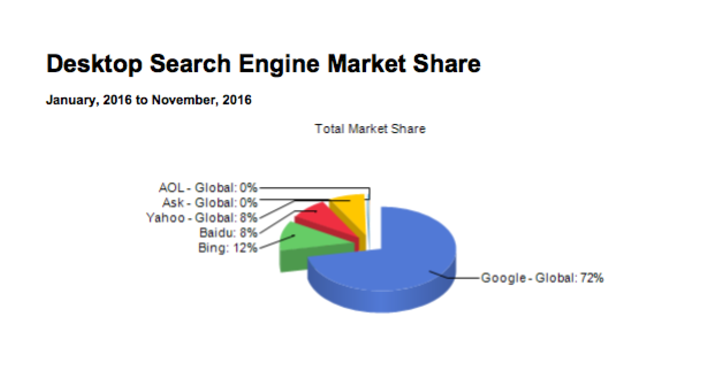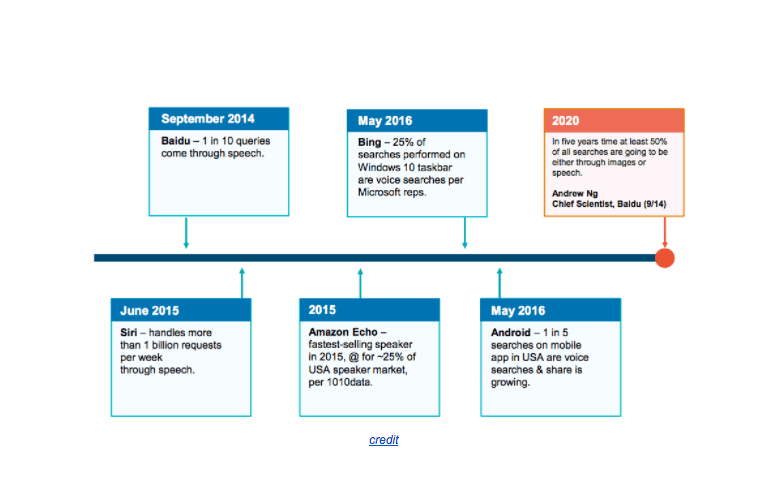Thanks to frequent updates and innovative algorithms, search engines evolve and become more sophisticated everyday. The SEO evolution has made it vital for online marketers to continually adjust their strategies and add new tactics in order to keep up with the requirements, retain visibility and continually improve keyword rankings.
As the year is slowly coming to an end, it’s the perfect time to look at the upcoming search marketing trends of 2017 and shed some light on how they will impact our day-to-day work. While there are plenty of innovations, let’s focus on the top three today:
The Voice Search
Source
OK Google, what’s the weather like tomorrow?
OK Google, please remind me to buy olive oil later this afternoon.
OK Google, what concerts are playing in my area this month?
OK Google, where can we eat pizza tonight?
OK Google, what’s the weather like tomorrow?
OK Google, please remind me to buy olive oil later this afternoon.
OK Google, what concerts are playing in my area this month?
OK Google, where can we eat pizza tonight?
Will Google become your personal assistant? Yes, that’s exactly the direction things are heading. The first and strongest SEO trend for 2017 seems to be the Google Voice Search. Search by Voice is a method of performing a search by speaking. It allows users to search the Web on their mobile device and desktop by only using their voice . To better understand what it’s about, watch these two short movies:
This innovation and its level of engineering is highly impressive, and it’s a serious game changer for online managers of any kind.
This is what the desktop search engine market share looks like now:
- How the Voice Search App works:
- Now you can talk to Google when you are using Chrome; no typing necessary., Just say, ”OK Google,” and ask your question:
This innovation and its level of engineering is highly impressive, and it’s a serious game changer for online managers of any kind.
This is what the desktop search engine market share looks like now:
According to the experts, Voice Search currently makes 20% of Google mobile searches in the US and 25% of ALL Bing searches. Baidu reports also say that voice searches make about 10% of all their searches. Overall, predictions indicate that by the year 2020, 50% of all web searches will be done by voice or images.
How does voice search work?
When you send a voice request to the search engine, it’s recorded, sent to the Voice Recognition API, and eventually converted to text. Then based on that text, Google recognizes keywords and matches them with the most relevant results. So technically there is no difference between saying or typing your queries as the engineering is exactly the same. The results will also look the same regardless of the search being spoken or typed.
However, there can be one slight difference: when using voice search, people get more personal and express their queries in a different manner. Nevertheless, the queries usually resemble each other and the results are pretty much the same.
Can we adjust our SEO efforts to keep up with voice search?
Yeah, definitely. You should take this “conversational” style of interaction into account, while optimizing your site. And remember to optimize for mobile search even more so as most voice searches happen there.
When you send a voice request to the search engine, it’s recorded, sent to the Voice Recognition API, and eventually converted to text. Then based on that text, Google recognizes keywords and matches them with the most relevant results. So technically there is no difference between saying or typing your queries as the engineering is exactly the same. The results will also look the same regardless of the search being spoken or typed.
However, there can be one slight difference: when using voice search, people get more personal and express their queries in a different manner. Nevertheless, the queries usually resemble each other and the results are pretty much the same.
Can we adjust our SEO efforts to keep up with voice search?
Yeah, definitely. You should take this “conversational” style of interaction into account, while optimizing your site. And remember to optimize for mobile search even more so as most voice searches happen there.
Mobile is Taking Over
The first paragraph validates the thesis that Google is steadily introducing the mobile-first era. The shift is already happening. Before, mobile search, similarly to local search and international SEO, was considered a more advanced specialization of SEO, as opposed to the fundamental - desktop - SEO.
Until now. On Friday, November 4, 2016, Google released big news on crawling and indexing sites for the Google index. Mobile-first Indexing has been officially announced. It’s still in the testing phase, but will ultimately be rolled out for good:
To make our results more useful, we’ve begun experiments to make our index mobile-first. Although our search index will continue to be a single index of websites and apps, our algorithms will eventually primarily use the mobile version of a site’s content to rank pages from that site...
This statement makes Google’s intentions clear, so let’s start prioritizing mobile search too.
Just take a look at this chart:
Until now. On Friday, November 4, 2016, Google released big news on crawling and indexing sites for the Google index. Mobile-first Indexing has been officially announced. It’s still in the testing phase, but will ultimately be rolled out for good:
To make our results more useful, we’ve begun experiments to make our index mobile-first. Although our search index will continue to be a single index of websites and apps, our algorithms will eventually primarily use the mobile version of a site’s content to rank pages from that site...
This statement makes Google’s intentions clear, so let’s start prioritizing mobile search too.
Just take a look at this chart:
The orange represents mobile search and the blue represents desktop in various industries. The mobile superiority is very visible here.
What does this mean for website owners, SEOs and online marketers?
This is a game changer for everyone who hasn’t yet taken mobile search seriously, as their mindsets needs to change. On the other hand, this doesn’t mean that you should suddenly start neglecting the desktop, as this is still a primary focus, but you can’t take this change for granted either. The switch to mobile will ultimately happen.
Catch up with the current demands in this field. If you don’t have a mobile site yet or the one you do have isn’t in the best shape, create one or polish it up. Responsive web design is the easiest solution to set up, manage and index. Check if your content pages display equally both on desktop and mobile. If your mobile version is poorer, mobile first indexing (once introduced for good) will destroy your rankings. So control and fix it. Rethink your website structure and design; find the simplest solution to boost user experience no matter what device your visitors use.
What does this mean for website owners, SEOs and online marketers?
This is a game changer for everyone who hasn’t yet taken mobile search seriously, as their mindsets needs to change. On the other hand, this doesn’t mean that you should suddenly start neglecting the desktop, as this is still a primary focus, but you can’t take this change for granted either. The switch to mobile will ultimately happen.
Catch up with the current demands in this field. If you don’t have a mobile site yet or the one you do have isn’t in the best shape, create one or polish it up. Responsive web design is the easiest solution to set up, manage and index. Check if your content pages display equally both on desktop and mobile. If your mobile version is poorer, mobile first indexing (once introduced for good) will destroy your rankings. So control and fix it. Rethink your website structure and design; find the simplest solution to boost user experience no matter what device your visitors use.
3. Google RankBrain
This part gets a little bit more complicated. Google RankBrain is an artificial intelligence system used by Google in its overall search algorithm, Hummingbird, to process search results.
To talk about RankBrain you need to understand what machine learning means. In simple words, it’s the ability of computers and machines in computing to teach themselves and become smarter without any human interference. Artificial intelligence (AI) pertains to the intelligence of a computer which can grow continuously by learning and building connections, eventually surpassing human intelligence.
So machine learning artificial intelligence is exactly what it sounds like - the ability of unlimited self improvement of machines in computing.
Little scary...? According to this Techcrunch’s article, the growth of computing throughout the twenty first century looks like this:
To talk about RankBrain you need to understand what machine learning means. In simple words, it’s the ability of computers and machines in computing to teach themselves and become smarter without any human interference. Artificial intelligence (AI) pertains to the intelligence of a computer which can grow continuously by learning and building connections, eventually surpassing human intelligence.
So machine learning artificial intelligence is exactly what it sounds like - the ability of unlimited self improvement of machines in computing.
Little scary...? According to this Techcrunch’s article, the growth of computing throughout the twenty first century looks like this:
A.I. zooms upward in intelligence toward humans. Then, it will hit the lowest capacity of humanity in (around) 2025.
Let’s leave it for now and get back to 2017.
How Google RankBrain will impact SEO
With Google's Rankbrain, your content has to do a better job than ever serving users' intent. Keywords are still important, but not at all in the same way they used to be.
For instance, Uptowork came up with a comprehensive guide to making a resume, and now it appears in search results for keywords "how to make a resume” and "how to write a resume".
Back in the day, you would need to have two separate articles if you wanted to rank for these keywords, but now Google results are aligning.
That's why you need to focus on topics instead of keywords exclusively. Use the language being used to ask questions, answer these questions, and solve real problems. What is the best way do that?
When you research a topic, make sure you read questions that users ask in comments under similar articles, go through relevant topics on forums or Quora, check what keywords your competitors’ articles are ranking for, and don’t forget to observe SERPs for a given query. That should give you an idea of what to include in your article to make your content outrank your competitors.
The integration of machine learning in search algorithms will open new doors in SEO. It will definitely become easier for search engines to identify what content is about and classify it, even without the use of a specific keyword. Search engines start to understand your content first - in a way that humans do - before ranking it. We can expect this trend will expand and search engines will use machine learning on a wider and wider scale. This will definitely influence ranking factors and change them.
Let’s leave it for now and get back to 2017.
How Google RankBrain will impact SEO
With Google's Rankbrain, your content has to do a better job than ever serving users' intent. Keywords are still important, but not at all in the same way they used to be.
For instance, Uptowork came up with a comprehensive guide to making a resume, and now it appears in search results for keywords "how to make a resume” and "how to write a resume".
Back in the day, you would need to have two separate articles if you wanted to rank for these keywords, but now Google results are aligning.
That's why you need to focus on topics instead of keywords exclusively. Use the language being used to ask questions, answer these questions, and solve real problems. What is the best way do that?
When you research a topic, make sure you read questions that users ask in comments under similar articles, go through relevant topics on forums or Quora, check what keywords your competitors’ articles are ranking for, and don’t forget to observe SERPs for a given query. That should give you an idea of what to include in your article to make your content outrank your competitors.
The integration of machine learning in search algorithms will open new doors in SEO. It will definitely become easier for search engines to identify what content is about and classify it, even without the use of a specific keyword. Search engines start to understand your content first - in a way that humans do - before ranking it. We can expect this trend will expand and search engines will use machine learning on a wider and wider scale. This will definitely influence ranking factors and change them.
Wrapping Up
That's all for today! The Voice Search, Google Accelerated Mobile Pages Project and Google RankBrain are the three most influential online trends that will have a huge impact on search marketing. Big changes will come, and the future looks very interesting. My final advice is to add those three trends to your Google alerts and monitor what happens in their field. Keeping up with the upcoming news will allow you to react quickly when necessary.










